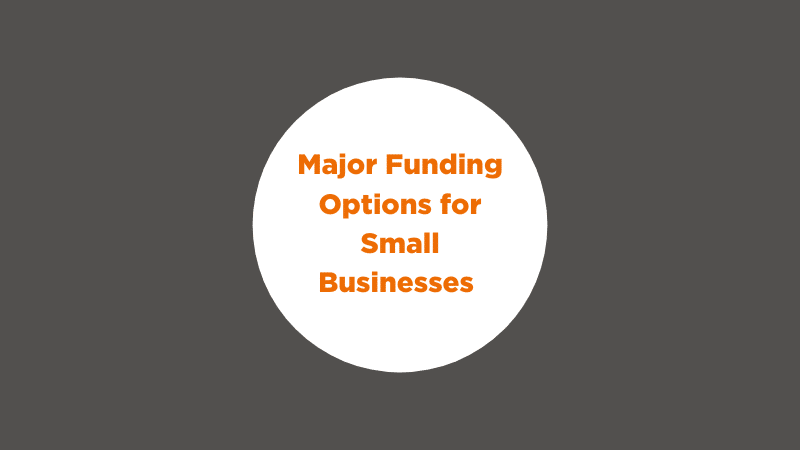The Major Funding Options for Small Businesses
Fri, Apr 16, 2021

What are the major funding options for small businesses?
For many businesses, a time comes when you need additional funding to help get your company fully off the ground. With 36% of small businesses utilising funding opportunities, understanding the main options available to you is the first step to securing financial support.
There are two main funding opportunities: equity and debt. While other options are available, such as grants and pre-sales, we will be focusing on the core opportunities.
What does equity financing include?
Equity funding is the exchange of ownership, usually for financial investment. However, in some circumstances, ownership in one company can be exchanged for purchasing a smaller business.
The advantages of equity funding are that small businesses don’t have to make any repayments, and interest is not charged on the funds. Additionally, you may benefit from the experience and connections of your investor.

The downside of equity funding is that you are required to give up some company ownership; particularly surrounding:
- Voting rights.
- Dividend rights.
- A share of proceeds on business wind-down or sale.
What are some examples of equity financing?
Many small businesses obtain equity funding from friends and family, often on non-commercial valuations. For example, they ask for a smaller company share because they are more optimistic about the company prospects and, sometimes, just want you to succeed.
Small businesses can also raise money through crowdfunding, using platforms such as Seedrs or Crowdcube. This funding method includes multiple people offering smaller investments rather than a small number of people giving a lot.
The platforms take a fee for raising and managing the investments. To achieve the best outcome, you’ll likely require a professionally designed ‘Pitch Deck’ and explainer video to generate interest.
Other equity funding options for a small business are angel investors and venture capital (VC):
Angel investors are experienced professional investors, generally offering their own money, whereas a Venture Capital typically takes in funds to invest in businesses with the possibility of exponential growth. They, therefore, invest higher amounts, and the fund or trust manages the investment.
Angel investors and VCs know that young businesses have a high risk of failure and will usually ask for a significant amount of ownership for their investment. They will also likely want to receive regular updates on progress and potentially have a seat on the board of directors.
Kayleigh’s advice on equity financing for small businesses
Portt & Co finance manager, Kayleigh, offers her thoughts on this type of financing:
The amount of ownership you need to give up will depend on the business valuation. For example, if your business is valued at £200k and you need to raise £100k, you’d likely be expected to give up 50% of the company in exchange.
For most small businesses, it is advantageous to avoid giving away equity as long as possible, ideally until the concept has been proven and sales are being achieved with an underlying profit or where a clear pathway to profitability exists. This is because a proven business will achieve a higher valuation; thus, taking in the same £100k at a £1m valuation would require giving away only 10% ownership.
However, suppose you expect high growth for your small business. In that case, you should consider raising equity since an interested party may want to make a significant investment that will take some time to generate the cash to repay.
What is debt funding?
Debt financing is a promise to repay a cash amount in future, usually always in return for a payment of interest on top. Debt funding is often preferable for small businesses since they do not need to give up any company ownership.
How does debt funding work?
Virtually all debt funders analyse debt security, such as commercial papers, treasury bills and bonds, when deciding whether to invest in a small business. Essentially, they are looking at the likelihood of repayment.
Debt security can be fixed or floating charges:
Fixed security is taken against a named asset such as a building or a piece of machinery. In the event of insolvency or non-repayment, the ‘fixed charge holder’ can claim entitlement to the control of that asset and sell it to recoup their investment.

Floating charges span a general category of non-specified assets, such as the company’s unpaid sales invoices. In the event of insolvency or non-repayment, the ‘floating charge holder’ can crystalise (or convert) the floating charge, making it specific and claim entitlement to controlling the sales invoices and collecting the money.
Debt security is often considered by ‘loan to value’ or LTV and is always a percentage of the amount lent against the security value. The lower the LTV, the lower the interest rate charged.
Debt funders will also often cap the amount they will lend. The LTV a debt funder will accept depends on the potential for change in an asset’s value. For example, a residential property often has a stable value that usually increases, whereas a batch of unpaid sales could decrease if a customer fails.
What debt funding options are available?
There are debt funders who will lend without security. Sometimes they are comfortable doing this if the company has a strong track record of profitability, and so they believe they will get repaid from future profits.
There are also debt funders who will require you to divert a percentage of your sales, making the company sales the debt security rather than the profits. This could be via a credit card terminal, for example.
Additionally, high-risk investors will lend to companies without security or a track record of profits; however, the interest rates on these arrangements can be extremely high in the region of 30-40% per annum.
Kayleigh’s advice on debt financing for small businesses
Kayleigh, offers her thoughts on this type of financing:
Often, small businesses lack significant security, so debt funders will ask the owners for a personal guarantee (PG). This means the company borrows the money using the owner’s personal assets as security.

Usually, the most significant asset is a house, and, therefore, serious consideration needs to be given before offering a PG. If the company fails, there is a good chance you will have to sell your home to repay the amount borrowed.
At the time of writing, the UK Government are offering debt funders a guarantee on behalf of small businesses, meaning if the business fails, the Government will repay the lender.
Whatever route you choose to go down, you must take significant consideration to understand what type of funding will work for you now and into the future.
Please be aware that this guide is not intended to represent specific advice to your company, and we encourage you to seek professional advice when deciding how to raise finance.